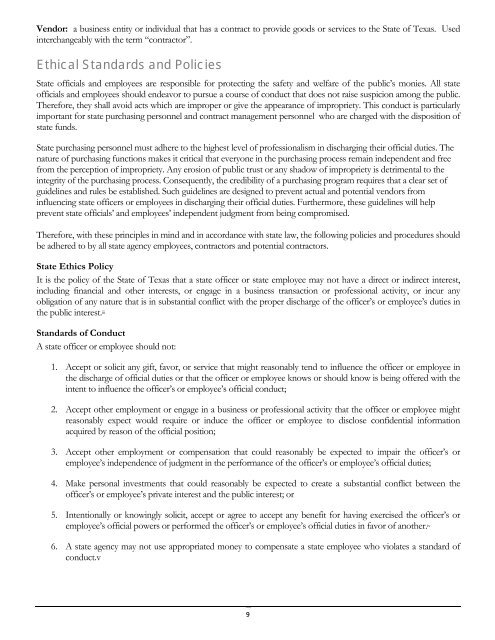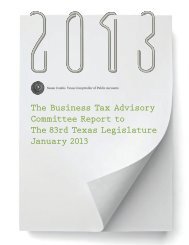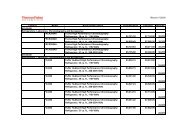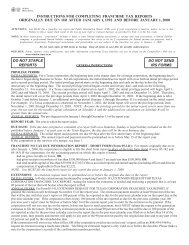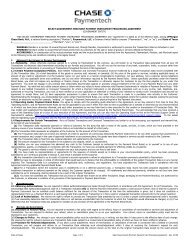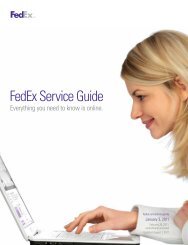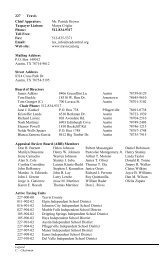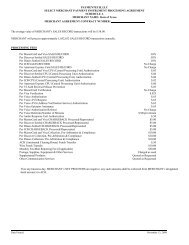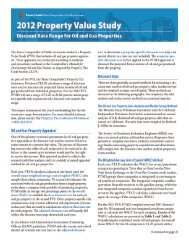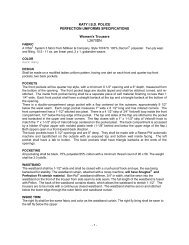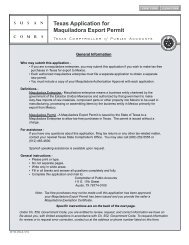Contracts Management Guide - Texas Comptroller of Public Accounts
Contracts Management Guide - Texas Comptroller of Public Accounts
Contracts Management Guide - Texas Comptroller of Public Accounts
Create successful ePaper yourself
Turn your PDF publications into a flip-book with our unique Google optimized e-Paper software.
Vendor: a business entity or individual that has a contract to provide goods or services to the State <strong>of</strong> <strong>Texas</strong>. Used<br />
interchangeably with the term “contractor”.<br />
Ethical Standards and Policies<br />
State <strong>of</strong>ficials and employees are responsible for protecting the safety and welfare <strong>of</strong> the public’s monies. All state<br />
<strong>of</strong>ficials and employees should endeavor to pursue a course <strong>of</strong> conduct that does not raise suspicion among the public.<br />
Therefore, they shall avoid acts which are improper or give the appearance <strong>of</strong> impropriety. This conduct is particularly<br />
important for state purchasing personnel and contract management personnel who are charged with the disposition <strong>of</strong><br />
state funds.<br />
State purchasing personnel must adhere to the highest level <strong>of</strong> pr<strong>of</strong>essionalism in discharging their <strong>of</strong>ficial duties. The<br />
nature <strong>of</strong> purchasing functions makes it critical that everyone in the purchasing process remain independent and free<br />
from the perception <strong>of</strong> impropriety. Any erosion <strong>of</strong> public trust or any shadow <strong>of</strong> impropriety is detrimental to the<br />
integrity <strong>of</strong> the purchasing process. Consequently, the credibility <strong>of</strong> a purchasing program requires that a clear set <strong>of</strong><br />
guidelines and rules be established. Such guidelines are designed to prevent actual and potential vendors from<br />
influencing state <strong>of</strong>ficers or employees in discharging their <strong>of</strong>ficial duties. Furthermore, these guidelines will help<br />
prevent state <strong>of</strong>ficials’ and employees’ independent judgment from being compromised.<br />
Therefore, with these principles in mind and in accordance with state law, the following policies and procedures should<br />
be adhered to by all state agency employees, contractors and potential contractors.<br />
State Ethics Policy<br />
It is the policy <strong>of</strong> the State <strong>of</strong> <strong>Texas</strong> that a state <strong>of</strong>ficer or state employee may not have a direct or indirect interest,<br />
including financial and other interests, or engage in a business transaction or pr<strong>of</strong>essional activity, or incur any<br />
obligation <strong>of</strong> any nature that is in substantial conflict with the proper discharge <strong>of</strong> the <strong>of</strong>ficer’s or employee’s duties in<br />
the public interest. iii<br />
Standards <strong>of</strong> Conduct<br />
A state <strong>of</strong>ficer or employee should not:<br />
1. Accept or solicit any gift, favor, or service that might reasonably tend to influence the <strong>of</strong>ficer or employee in<br />
the discharge <strong>of</strong> <strong>of</strong>ficial duties or that the <strong>of</strong>ficer or employee knows or should know is being <strong>of</strong>fered with the<br />
intent to influence the <strong>of</strong>ficer’s or employee’s <strong>of</strong>ficial conduct;<br />
2. Accept other employment or engage in a business or pr<strong>of</strong>essional activity that the <strong>of</strong>ficer or employee might<br />
reasonably expect would require or induce the <strong>of</strong>ficer or employee to disclose confidential information<br />
acquired by reason <strong>of</strong> the <strong>of</strong>ficial position;<br />
3. Accept other employment or compensation that could reasonably be expected to impair the <strong>of</strong>ficer’s or<br />
employee’s independence <strong>of</strong> judgment in the performance <strong>of</strong> the <strong>of</strong>ficer’s or employee’s <strong>of</strong>ficial duties;<br />
4. Make personal investments that could reasonably be expected to create a substantial conflict between the<br />
<strong>of</strong>ficer’s or employee’s private interest and the public interest; or<br />
5. Intentionally or knowingly solicit, accept or agree to accept any benefit for having exercised the <strong>of</strong>ficer’s or<br />
employee’s <strong>of</strong>ficial powers or performed the <strong>of</strong>ficer’s or employee’s <strong>of</strong>ficial duties in favor <strong>of</strong> another. iv<br />
6. A state agency may not use appropriated money to compensate a state employee who violates a standard <strong>of</strong><br />
conduct.v<br />
9


